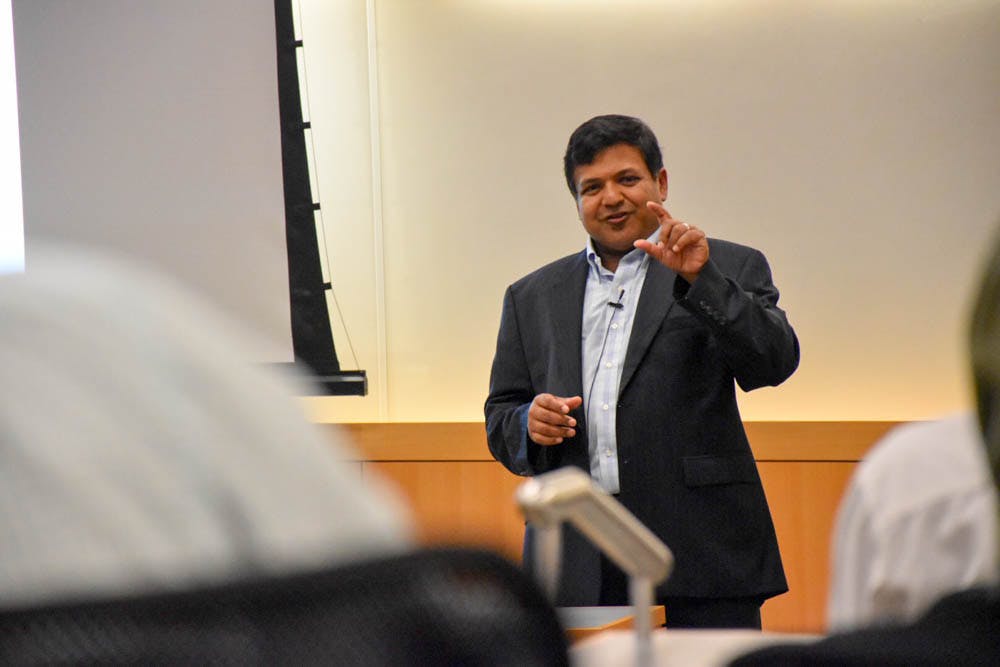Open to students, faculty members and staff members, Healthcare in America is a lecture series and pre-clinical elective at the Alpert Medical School running through December. The lecture series is open to all community members, though medical school students can take the elective for a credit if they attend a certain number of lectures.
Eli Adashi, professor of medical science and former dean of medicine and biological sciences, brought the idea of a course taught mostly by outside healthcare professionals to the medical school in 2011. The need for the course gradually became apparent to Adashi as he spoke with medical students over the years and realized they were not receiving a good foundation in learning about the healthcare system, though it is “essential to their future way of life,” he said. The healthcare system is very complex, and the more students know about it, the more easily “they will be able to navigate it when they become practicing physicians,” he added.
Adashi’s initial role in the elective course was to come up with the idea and identify potential speakers. But once the program was in place, “students increasingly began to take over the administrative and organization features,” Adashi said. “The students at this point reach out to the potential speakers, coordinate schedules and arrange for their pickup if they need one.”
Jonathan Staloff ’14 MD-ScM’19 is one of the students who has stepped up to lead the course. After taking it last year, Staloff signed on this year to make some improvements, such as cutting down the number of speakers and recruiting some prominent speakers from outside Providence.
When picking this year’s speakers, Staloff and the other student leaders prioritized exposing medical school students to “physicians and other healthcare providers who have really carved a leadership role in healthcare outside traditional clinical medicine,” Staloff said. “I’ve always had an eye for finding speakers who could speak to a systemic issue and also expose medical students to alternative career paths,” he added.
This year, one of the lecture series’ most prominent speakers was Rushika Fernandopulle, chief executive officer and co-founder of Iora Health, a primary care startup that is “completely reimagining the health care system and how primary care is delivered,” Staloff said. “I wanted to expose students to the importance of primary care and the opportunity to lead health system change through a life in business innovation and startups,” he added.
Sarah Kler MD’21, who is currently taking the course, said Fernandopulle was “a very engaging speaker.”
“He did a great job talking about why he’s doing what he’s doing and what in healthcare led him to make the changes that he’s making, which I think is exactly what you want to hear as a student,” Kler added.
Anupam Jena, associate professor of healthcare policy at Harvard Medical School, was another big name Staloff and other student leaders invited to speak. Sukrit Jain ’16 MD’20 thought Jena’s lecture was “very engaging.”
“He had this really interesting lecture where he would show us a scenario, and we’d be asked to come up with different research questions and how we would go about pursuing them,” Jain said.
Other prominent speakers who have come to speak this year include Meena Seshamani ’97, director of the U.S. Office of Health Reform, and Marilyn Tavenner, CEO of America’s Health Insurance Plans.
For both Kler and Jain, the Healthcare in America lecture series has been very effective in its objective of showing students the differences they can make in healthcare outside of clinical medicine.
“You meet individuals who are doing specific things outside of just providing clinical care, and I think we’ve seen a wide variety (of fields), like public service (and) private industry, ” Kler said.
The effectiveness of the course “was very evident from the first class when (Fernandopulle) talked about ways in which you could break out of the current system and … deliver healthcare more efficiently,” Jain said, adding that the speakers have ultimately showed the students “ways (they) can go beyond solely being physicians and move toward physician ‘hyphen’ something, whether it’s physician-researcher, physician-policymaker and so on.”





